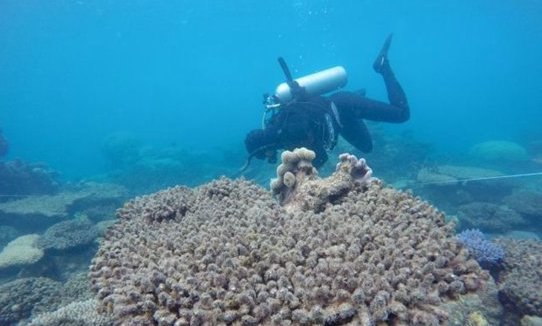The Great Barrier Reef is increasingly eroded Australia spends more than 300 million yuan on insurance
The Great Barrier Reef is the largest and longest coral reef in the world and is an ideal diving destination for many diving enthusiasts. Unfortunately, with the increasing global warming, the temperature of the sea is gradually rising, and more and more coral reefs are bleaching in the World Heritage Great Barrier Reef in recent years. On January 22, the Australian government announced that it would spend 60 million Australian dollars (more than 300 million yuan) to conserve the Great Barrier Reef.

Australian World Heritage site coral on the Great Barrier Reef has been eroded by thorn-crowned starfish in recent years. Australian Prime Minister Turnbull announced on January 22 that 60 million Australian dollars (about 307 million yuan) will be allocated for conservation to curb the damage caused by starfish to the Great Barrier Reef.
Australian Prime Minister Turnbull said in a statement on January 22 that half of the funds allocated by the government will be used to encourage farmers to reduce the dumping of waste into the sea to prevent pollutants from exacerbating the ecological crisis on the Great Barrier Reef. In addition, the government will increase patrol boats and divers to eliminate starfish, partially allocate research funds for the reconstruction of the Great Barrier Reef, and establish warning systems and regulations to prevent coral bleaching.
Australian World Heritage Great Barrier Reef corals have been eroded by thorn-crowned starfish in recent years. Spinous-crowned starfish abruptly increase and eat a large number of corals, which seriously bleach many corals.
It is reported that the Australian Ocean Park tourist operators Association has summoned 25 divers to go out to sea and dive underwater to poison these "coral killers" with poison needles.
- Prev
Give up millions of annual salary to grow organic kiwifruit Wang Xiaotie's five-year achievement
This is an assignment that I finished in 5 years. I asked the teachers of my alma mater to rate it. On January 21, alumnus Wang Xiaotie presented a box of organic kiwifruit with both hands to Xu Yangfu, deputy secretary of the school's party committee. Behind them, 5000 boxes of the same kiwifruit filled seven trucks, and soon
- Next

Case study: how Jiapei kiwifruit becomes 10 billion products through stable production
If you want to build a fruit brand, large-scale production with stable quality is a necessary prerequisite. Next, we try to interpret how technological upgrading and organizational change reduce the natural ring through the case of New Zealand kiwifruit manufacturer Zespri.
Related
- A one-day flower show brings 130 million yuan in orders! Nanhai, this Phalaenopsis exhibition is amazing
- What do the flower language and meaning of Lutheran tree mean? Precautions for planting Lutheran tree
- Encounter Chaoshan Kongfu tea, not without this cup of Phoenix single clump
- The durian market in Vietnam and Thailand is flooded. The price of imported durian has plummeted by 30-40% in a month.
- Shanghai solved the problem of local vegetable supply by planting 80,000 mu of green leafy vegetables.
- Wageningen University has become the best agricultural university in the world for the seventh time in a row.
- The strongest export season of South African grapes is full of challenges, with exports to Russia falling sharply by 21%.
- Sri Lanka is on the verge of bankruptcy, "Tea for debt" Organic Agriculture Revolution aggravates the Food crisis?
- Turning waste into earthworm manure and worm manure into organic fertilizer-A new choice for auxiliary farming
- Organic rice growers shoulder the responsibility of nurturing agricultural talents! Yinchuan Sustainable Farm with Organic Life Camp

